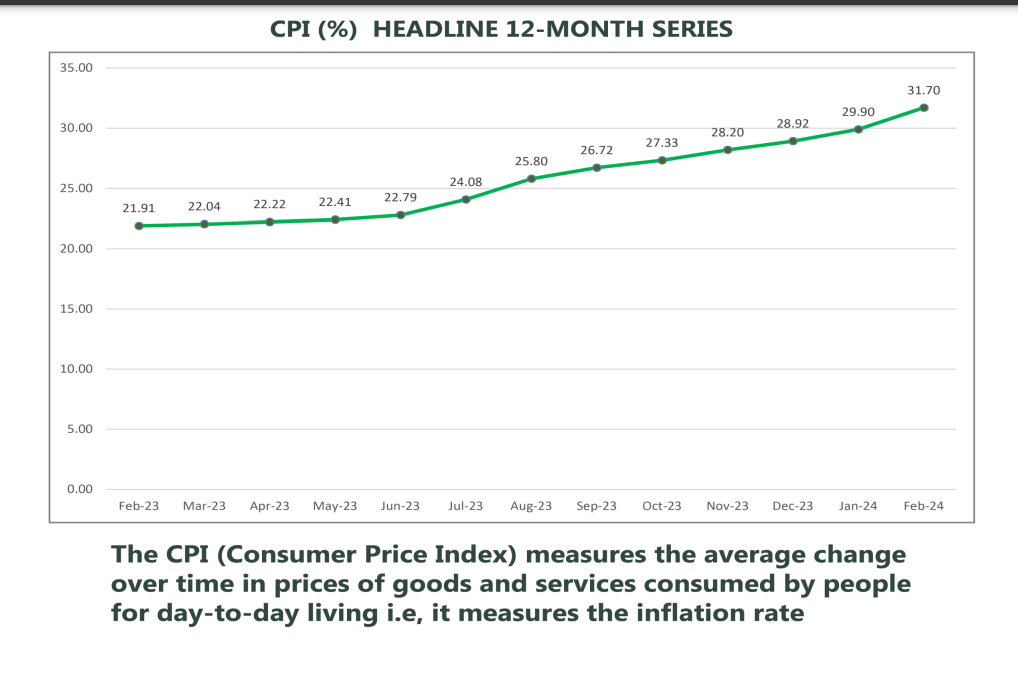CliqJets Consulting
Fostering Growth, Innovation, and Sustainability in Airline Operations
Increased Inflation Set to Negatively Impact Nigeria Airline Profits
In Nigeria, the resurgence of inflationary pressures has become a prominent topic once again, as highlighted by the February 2024 Consumer Price Index (CPI), which unveiled a substantial rise in the headline inflation rate to 31.70%, compared to 29.90% recorded in January 2024. This surge reflects a notable increase of 1.80 percentage points on a month-on-month basis, signaling a challenging economic landscape on the horizon. While inflation exerts its influence across various sectors, its impact on Nigerian airlines is particularly significant, presenting formidable obstacles to their profitability (National Bureau of Statistics, 2024). In this article, we delve into the underlying factors contributing to this impact and offer recommendations for mitigating its adverse effects on airline profits.
Understanding Inflation

The concept of inflation is subject to various interpretations, but economists widely concur that it entails a persistent escalation in the prices of goods and services (Central Bank of Nigeria, n.d.). Simply stated, inflation characterizes an economic scenario characterized by a continuous uptrend in the prices of goods and services, often described as a situation where “too much money is chasing too few goods.” During periods of inflation, the purchasing power of the currency diminishes, resulting in a gradual erosion of its value over time.
According to The Economic Times (2019), inflation arises due to several factors, including imbalances in the demand and supply of money, alterations in production and distribution costs, or increases in taxes on products. As inflation unfolds and the price level of goods and services rises, the value of the currency decreases. Consequently, each unit of currency affords fewer goods and services.
Given these dynamics, it is imperative to examine how inflation impacts Nigerian airlines and devise effective strategies to navigate these challenges.
How Inflation Impacts Airline Profits
1. Increased Operating Costs and Airline Profits:
One of the primary ways inflation affects airlines is through increased operating costs. As the prices of fuel, labor, and maintenance rise, airlines are burdened with higher expenses, squeezing their profit margins. Fuel costs, in particular, constitute a significant portion of airlines’ operating expenses. When inflation drives up oil prices, airlines face escalating fuel bills, eroding their profitability.
2. Reduced Consumer Spending:
Inflation can also lead to reduced consumer spending power, as individuals find their money buys less than it used to. Consequently, passengers may become more price-sensitive, opting for cheaper travel alternatives or cutting back on discretionary spending, such as air travel. This decreased demand can directly impact airlines’ revenues, especially if they are unable to adjust their prices accordingly.
3. Airline Profits and Impact on Pricing Strategies:
Inflationary pressures often force airlines to adjust their pricing strategies. However, increasing ticket prices too steeply can further dampen demand, potentially leading to empty seats on flights. Conversely, maintaining low prices in the face of rising costs can eat into profits. Striking the right balance becomes crucial for airlines in managing their revenue streams amidst inflationary environments.
4. Currency Fluctuations:
Inflation can also trigger currency fluctuations, especially in economies where inflation rates differ significantly from those of trading partners. For airlines operating internationally, fluctuations in exchange rates can impact revenues and costs, affecting profitability. The uncertainty surrounding currency fluctuations adds another layer of complexity for airlines navigating inflationary environments.
- Fixing Aviation Surety Bonds in NigeriaIn aviation, financial security must be as reliable as aircraft safety systems designed for function, not forced to fit (Aviation Surety)
- When Safety Meets the Clock: Why Airlines Can’t Afford to GambleSafety may be the crown jewel of aviation, but schedule integrity is the invisible crown holder.
- NSIB Hosts 12th BAGAIA Commission Meeting in AbujaNigerian Safety Investigation Bureau (NSIB) yesterday welcomed delegates from across West Africa to Abuja
Recommendations for Mitigation
1. Efficient Fuel Hedging:
Airlines can mitigate the impact of rising fuel costs by engaging in fuel hedging strategies. By locking in fuel prices at favorable rates through futures contracts, airlines can shield themselves from sudden spikes in oil prices, providing stability to their operating costs.
2. Streamlining Operations:
Inflationary environments necessitate a focus on operational efficiency. Airlines can optimize their routes, aircraft utilization, and staffing levels to minimize costs while maintaining service quality. Embracing technology and automation can further enhance operational efficiency, enabling airlines to do more with less.
3. Diversification of Revenue Streams and Airline Profits:
To reduce reliance on ticket sales, airlines can explore diversifying their revenue streams. This may include offering ancillary services such as in-flight Wi-Fi, premium seating options, or partnering with travel agencies for package deals. Diversification can help cushion the impact of reduced passenger spending on ticket sales.
4. Flexible Pricing Strategies:
Adopting dynamic pricing strategies that respond to changes in demand and operating costs can help airlines optimize their revenues. By leveraging data analytics and machine learning algorithms, airlines can dynamically adjust ticket prices to maximize revenue while filling seats efficiently.
5. Currency Risk Management:
Airlines operating in international markets should implement robust currency risk management practices. This may involve using financial instruments such as forward contracts or currency options to hedge against adverse exchange rate movements, safeguarding revenues and costs from currency fluctuations.
Conclusion
While inflation poses significant challenges for airlines, proactive measures can help mitigate its adverse effects on profitability. By adopting strategies such as efficient fuel hedging, operational streamlining, revenue diversification, flexible pricing, and currency risk management, airlines can navigate inflationary environments more effectively, safeguarding their revenue streams and ensuring long-term sustainability amidst economic uncertainties.
References
Central Bank of Nigeria. (n.d.). . WHAT IS INFLATION AND WHY MUST THE CENTRAL BANK FIGHT HARD TO SUBDUE THIS MONSTER? HOW DOES INFLATION AFFECT THE ORDINARY MAN. https://www.cbn.gov.ng/out/eduseries/seriesinflation.pdf
National Bureau of Statistics. (2024, March). Reports | National Bureau of Statistics. Nigerianstat.gov.ng. https://nigerianstat.gov.ng/elibrary/read/1241470
The Economic Times. (2019). Definition of | What is? Meaning – The Economic Times. The Economic Times. https://economictimes.indiatimes.com/definition/Inflation





0 Comments